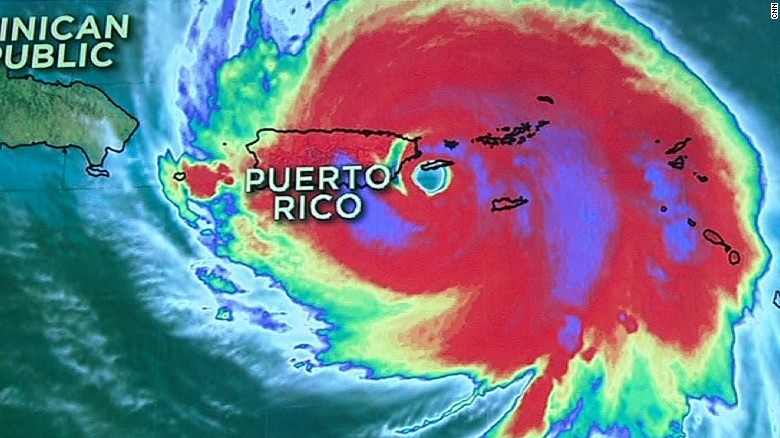With every major catastrophe loss event it’s common to hear discussion of whether it will be a hit to reinsurer earnings, or to their capital. 2017 was running as a definite earnings impact to the majority of reinsurers, but the addition of a high loss estimate for hurricane Maria’s Caribbean impact has moved Fitch’s opinion and it now warns of the potential for rating actions.
 “Given the magnitude of the Maria-estimated losses, we now believe that 2017 catastrophe losses will constitute a capital event for a number of (re)insurance companies, as opposed to just an earnings event,” Fitch Ratings explained yesterday.
“Given the magnitude of the Maria-estimated losses, we now believe that 2017 catastrophe losses will constitute a capital event for a number of (re)insurance companies, as opposed to just an earnings event,” Fitch Ratings explained yesterday.
Excess capital in the reinsurance sector will help to limit impact to solvency for most, but Fitch is warning that there could be some reinsurers that find themselves overexposed to the aggregation of 2017 major losses.
“We believe there is heightened risk that combined loss concentrations to these events for several (re)insurers will result in a capital decline for full-year 2017,” Fitch continues, warning of the potential for rating actions (likely downgrades) should reinsurers that are hit particularly hard not address issues with “capital raises or other mitigating actions.”
AIR Worldwide came out with a much higher estimate of the insurance industry impact from hurricane Maria than the industry seems to have been expecting, suggesting that hurricane Maria could add between $40 billion and $85 billion to the industry toll from recent catastrophes.
Fitch notes that following the impact of hurricane Maria, the global insurance and reinsurance industry, including insurance-linked securities (ILS) funds and collateralised vehicles, is facing at least a $100 billion loss year, perhaps as much as $190 billion on a pretax basis.
At the upper end of that range this would be a record year for global catastrophe losses, which Fitch says, “could weaken capital at some (re)insurers and increase the risk of rating downgrades.”
In getting to the upper end, Fitch notes the $85 billion top-end estimate for hurricane Maria, around $50 billion for hurricane Irma, $25 billion for hurricane Harvey, $3 billion for the Mexico earthquakes and at least $20 billion from the first-half of the year.
The industry remains well-capitalised, with reinsurers thought to command somewhere around $600 billion of capital including the alternative markets, but an erosion of one sixth or more of that is meaningful enough to perhaps put some companies under pressure.
The aggregation of these losses also threatens to show up any lack of underwriting discipline, we believe, with issues such as the hours clause potentially brought into focus, as well as expanded contract terms, bundling of lines of business, and other issues which could result in loss concentrations emerging in the market.
Fitch expects that global reinsurers will be the most exposed to this aggregation of catastrophe loss events, although it notes that it does not cover many local Puerto Rican insurers, or Florida specialty companies in its ratings. Also at risk are some of the larger diversified primary insurance players in the U.S. and some global insurance players as well, which could report material catastrophe losses from these recent events.
As yet, Fitch says it has not identified any insurers or reinsurers deserving of placing on a negative rating watch, but that could come with clarity over the eventual losses that companies will suffer.
Also Fitch said that if it comes to light that any companies are particularly exposed to concentrations of losses, in Puerto Rico especially, then their ratings could be placed on watch.
Reinsurers most exposed to rating action will be those whose eventual losses from 2017 events are greater than modelled expectations would have suggested, the rating agency said.
Major reinsurers are only likely to experience an earnings event from these losses, in some cases only a Q3 earnings event, not even a full-year, as they are so well capitalised.
But smaller, catastrophe focused reinsurers could find this turns into a capital event, eroding excess and even creating the need to raise more funds.
As we wrote before, reinsurers might be advised to consider tapping the capital markets and alternative capital providers, before they look to raise new equity. Leveraging third-party capital to help come out the other side of 2017 losses still underwriting could be a more efficient way to maintain market presence, without diluting corporate value.
Whether these losses will lead to rate rises remains uncertain. In this article yesterday we took a closer look at the potential for reinsurance price increases, concluding that there would likely be some, but localised and perhaps even short-lived, despite the high level of industry losses.
Whatever the outcome, price wise, this is an opportunity for those that can mobilise capital to provide continuity to cedents, both in the short-term for those that have eroded reinsurance or retrocession programs, and at the upcoming January renewals.
Come January, some reinsurers may be experiencing some pain, if they have indeed suffered a capital sized event. That could mean growth opportunities for the largest global players, those that can bounce back fastest and of course, the efficient alternative capital markets.
 View all of our Artemis Live video interviews and subscribe to our podcast.
View all of our Artemis Live video interviews and subscribe to our podcast.
All of our Artemis Live insurance-linked securities (ILS), catastrophe bonds and reinsurance video content and video interviews can be accessed online.
Our Artemis Live podcast can be subscribed to using the typical podcast services providers, including Apple, Google, Spotify and more.































